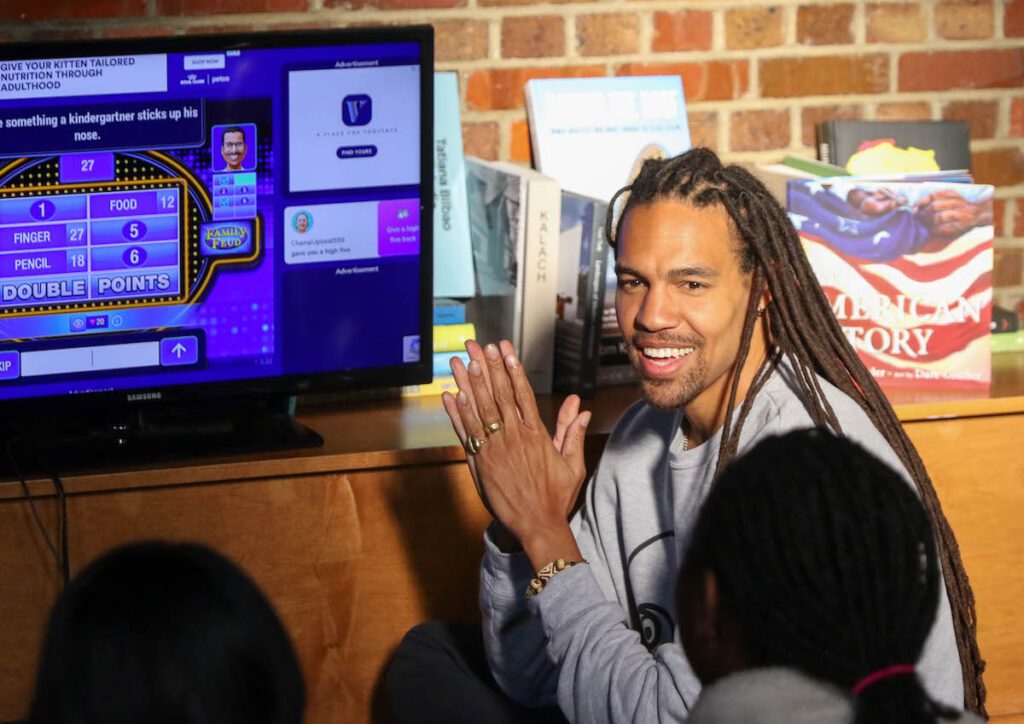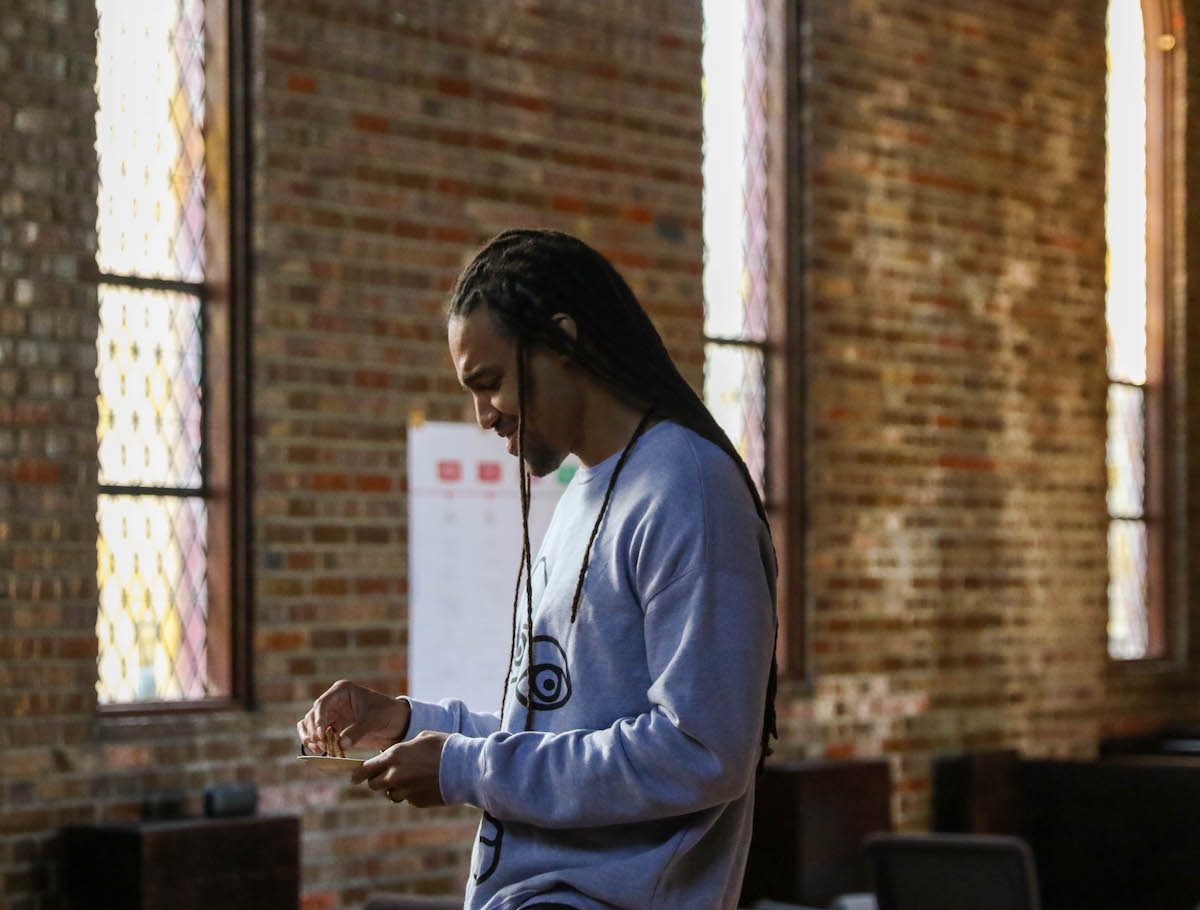Imprisonment by the 1-inch by 2-inch Zoom rectangle describes Pierce Freelon’s term as a Durham City Council member. Appointed in summer of 2020, he served when the pandemic was at its worst.
“So much of campaigning, so much of developing a platform is about community engagement… It’s pulling up to somebody’s church or mosque or synagogue or shrine, their birthday party or fish fry,” says Freelon, 39. But in countless eight-hour Zoom days, he was forced to engage his community from within the four corners of his computer.
Now, after relinquishing his role in local politics in 2021, Freelon sits on the patio of Cloche Coffee. He was no longer eligible to continue serving on City Council after he, his wife Katye Proctor Freelon, and their two children found a home outside the city. Freelon says he is not opposed to reentering county or state politics in the future, “but it just so happens that the capacity in which I was serving was no longer possible when we moved to a new place.”
The former politician, now fearless and free, is finding joy through music and family. His current projects celebrate ancestors and the importance of community. They also make a point that we shouldn’t be afraid of death.
In addition to serving on the City Council, Freelon is a Grammy-nominated children’s musician; the founder of Blackspace, a digital makerspace for Durham youth of color; and a former lecturer in music and African-American studies at the University of North Carolina at Chapel Hill. He is from a prominent Durham family (his mother Nnenna is a famous jazz singer; his late father Phil was a well-known architect), but Freelon is known for his own accomplishments.
On the patio of the coffee shop, he pauses telling me about his upcoming book, “Daddy & Me, Side by Side” to demonstrate a practice he learned from his father: just sitting, closing his eyes, breathing, and sharing what he observes. It is one of those rare days when spring shows promise of replacing winter for good: the sun’s warmth has a lethargic effect, forcing everyone to slow down.
His skin glows beneath the sunshine, emphasizing his magnetic presence. Freelon shuts his eyes in a posture of tranquility, saying he notices “cars, probably some HVAC, but also the breeze, and the birds, and the sun.” With long locs and a wide, easy smile, one could never guess he’s turning 40 this December.
Freelon’s latest book, scheduled to release on May 2, explores intergenerational bonds through the story of a camping trip with his son, Justice. The father and son enjoy the serenity of nature, a space where Freelon feels the spirit of his ancestors. After romping through the woods and peering under rocks, the second half of the book reminisces on Freelon’s father, Phil, who died in 2019.
The author/singer reopens his eyes. “We’re not human doings, we’re human beings,” he says, quoting a friend. Both the book and Freelon proclaim that there is something beautiful about spending time outdoors “perceiving our surrounding world” and being “present.” He gathers his waist-length locs, draping them over his left shoulder while wiggling a foot free from its shoe.
* * *
Freelon arrives at the Freedom Dreaming Design Camp for 6th to 8th graders, hosted by NorthStar Church of the Arts. His smile seems to be a magnet for the kids, with dozens of eyes lingering on him as he wanders around the chapel to get a glimpse of what the campers have been doing in the past week. By bringing in a variety of local artists and designers, the week-long camp provides the kids with artistic inspiration and a chance to be creative.
Before Freelon’s father died from amyotrophic lateral sclerosis (ALS), he and Freelon’s mother transformed the old church into a sanctuary that commits to “consistently elevate and properly resource artists of color and artists from the queer community,” according to Executive Director Germane James. The vast space showcases exposed hardwood and thousands of richly-colored bricks.
Breakfast from a local bakery appears shortly after Freelon arrives. The middle schoolers crowd the treasure box of carbs to claim whichever croissant or cinnamon roll speaks to their souls. Freelon ensures none of the tweens are in danger of overdosing on chocolate croissants before relocating to lush floor pillows.

Where traditional churches might have a pulpit there is a small television, inviting the middle schoolers and Freelon to gather around. Freelon then pulls up an online version of “Family Feud.” He pretends to be the show’s Steve Harvey and prepares the kids for an epic battle against the computer-generated opponent, Marquis. Light seeps through a stained glass window, exposing lingering dust particles floating through the air, and creating a halo effect around Freelon as he types the responses to “name something a kindergartener sticks up his nose.”
An eruption of answers echoes under the high ceilings. One girl draws on personal experience, sharing that she’s stuck a Skittle up her nose before. “Anyone else stick food up their nostrils?!” asks Freelon.
This is a special church. Its hymns, as found on the campers’ “Jukebox” list, include “Boy’s a liar” and “Shawty Got Wap Like Fetty.” The picture book “Dream Builder: the Story of Architect Philip Freelon” lies beside the television as a sweet reminder of Phil Freelon’s legacy. (He led the design team for Washington D.C.’s National Museum of African American History and Culture and was appointed to the U.S. Commission of Fine Arts by Barack Obama in 2011.)
After finding out one of the campers will be visiting the Dominican Republic in a couple months, Freelon shares a video about his time making art with Dominican and Haitian young women this past winter. They wrote songs, painted butterflies, and told stories — all as a way to increase awareness about violence against women and girls around the world.
By this point, the sugar high kicks in. About half the kids start whacking their buddies’ faces with floor pillows.
“If you’ve ever been with Pierce… around a bunch of young people, it’s super fun,” says Steve Schewel, the former mayor of Durham who worked with Freelon while he was on the City Council. “He makes everything fun.”
* * *
Freelon’s next project is quite personal, a children’s album called “AnceStars.” It’s a collaboration with his mother. As the pun suggests, the mother and son are using their craft to celebrate ancestors, explore the idea of where we come from, and ponder where we go when we die.
Like so many things in his life, it is rooted in, and informed by, his family. Nearly four years after his father died, Freelon is at peace with death – despite not knowing what comes after.
“I have no f—ing idea (where we go). But, I’ll tell you what, I’m curious. I’m really curious to find out,” says Freelon, “and I’m unafraid.”
Freelon then half-sings, half-explains that death is as natural as an apple falling from a tree. “Nobody mourns the apple… we just eat the apple, then we shit the apple,” he says. “Everyone who has ever been has died. Unless we wanna be zombies – which nobody wants to be a f—ing zombie – we are going to die.”
Music producer Rem Morin, who has worked with Freelon in his music career since his first album, says they’ve become like brothers. When they produce music together, it never feels like work. After Morin’s wife suffered a miscarriage, Freelon honored them and their unborn baby Juniper in “AnceStars.”
“It’s a very life-changing album. It’s an album full of joy,” Morin says, “It’s full of wonderful things, but also touches on very serious topics.”
In addition to honoring lives lost, Freelon’s music glorifies the voices of those most important in his life. His daughter, Stella, has both inspired and been featured on much of Freelon’s music. For Freelon, “Parenting is music.” He finds that lyrics and melodies are more effective than discipline. Understandably, brushing your teeth is much more enjoyable when the command is sung to you and put to an Afrofuturistic beat (check out “Tooth Bruh”).
Freelon isn’t just a dad, but a mentor, a coach, and even a student of his kids. Stella once wrote herself a Valentine’s Day card where she described herself as a “wo-wo.” Freelon explains, “Wo-wo is the name for a woman that doesn’t have “man” in it. Because why would “woman” need “man” in it?” (Impressive for a girl aged 6 or 7 years old at the time.) “I thought that was dope… she’s expansive,” says Freelon.
Above all, Freelon wants his kids to be free — free to do what they love, to go where they want, to be who they choose. He believes freedom is found from within. “It is an outward projection of your self-love and cosmic majesty. No one can take that away from you,” says Freelon, having been referred to as ‘one of the freest people who has ever lived’ by a friend just the night prior.
At last, liberated from the Zoom rectangle.
Photo at top: Pierce Freelon, photo by Abigail Bromberger – The 9th Street Journal





